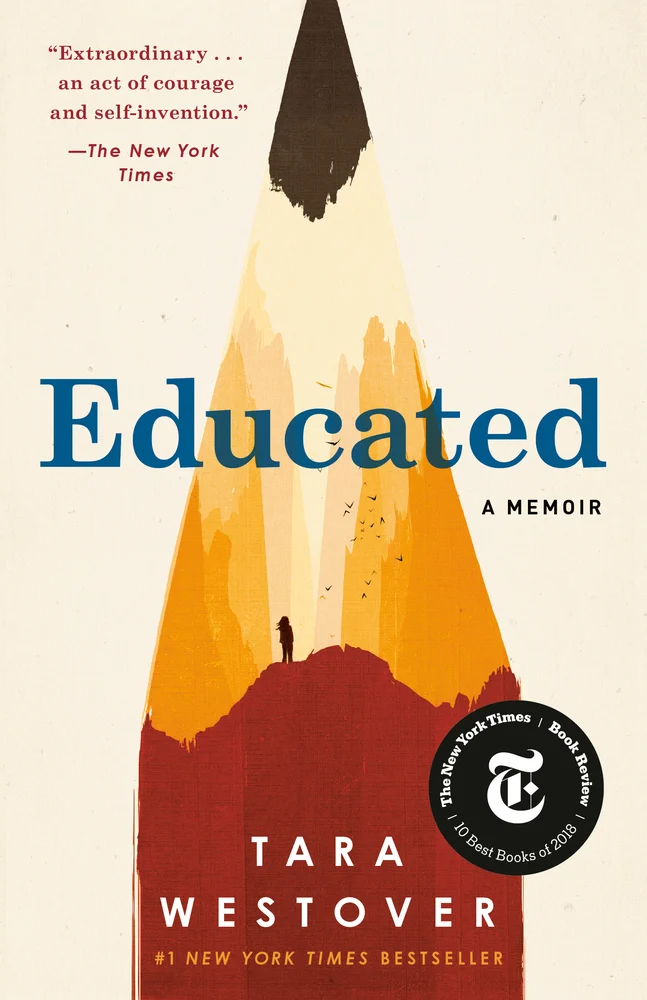NOTE: I’m going to talk about a memoir I just read that deals HEAVILY with religious, physical, verbal, and emotional abuse. I’m going to be making a few references to that abuse. If that’s not something you wish to read about, you do not have to read this post. Self-care is the best care.
While I mostly read speculative fiction, memoirs are a genre I greatly enjoy as well. Something about diving into someone else’s mind and history makes for quite an intimate read and experience. I love when memoirs and autobiographies sprinkle in humor like Jenny Lawson’s do, but then, The Bloggess has always been funny. Sometimes, a memoir doesn’t work for me, as in the case of Real Queer America, which I’ll write about at some point, and sometimes, a memoir hits me until it doesn’t, which is the case of the most recent one I read: Educated by Tara Westover.
I hate being critical of a memoir because I know that it is someone’s life. It’s their lived in experiences and thus, everything between the pages is valid. That being said, Educated hooked me from moment one. Tara’s experiences growing up in a fringe cult of Mormonism made for a terrifying read and reminded me that there are definitely still pockets of America where people receive no education at all.
For example: Tara didn’t go to any school, not even homeschool, until college. She managed to sneak her way into admission to BYU without ever having heard of the Holocaust. She didn’t know who MLK Jr. was or that slavery had been a thing. She didn’t know how to solve 3 + x = 6. She didn’t know what a noun was or how to write a paragraph. She could read and write some, but she probably entered college with a 2nd grade education at best. Even worse, she didn’t know she could ask anyone for help. She grew up being told that all doctors and medications were evil and that prayer was the only answer.
This book also reminded me of why people like my therapist exist—folks who are trained in helping folks with religious trauma. There are too many of us who escape situations where body autonomy and basic rights are seen as sin. It’s a lot to unpack for anyone.
While I immensely enjoyed the book for the first 90% of it, the ending left me angry. The author makes it very clear that despite her brother trying to kill her multiple times, often in front of her parents, and her surviving a ton of horrific abuse from her parents and brother, she holds no grudge against them. I wasn’t expecting her to hate them, but her violent brother has children of his own, children who aren’t educated and are likely suffering at the hands of his violent temper. How does she know he won’t kill one of his own kids? After all, he tried multiple times to kill her. He killed his son’s dog because he was angry and did it in front of him. Slowly. How is this man even remotely safe for anyone to be around, especially those held in the belief that they this is okay because God said so?
Her sister protects the family because her twisted religious beliefs tell her she has to. She also doesn’t educate her kids who also have contact with this volatile family. Tara’s parents make tons of money selling snake oil and convincing people that it’s from God and prayer will cure cancer.
I’m not saying all religion or all religious folks are bad. Not at all. I’m not even saying homeschooling is bad. However, if you know that someone is harming children and you don’t report it, I take major issue with that.
As a teacher, I was required to report even the suspicion of abuse and for a good reason. Also, it’s illegal for kids under 18 to not be enrolled in some form of education, be it public, private, or homeschooling. It’s possible that behind the scenes, folks were reported to the proper authorities and that info’s not included in the memoir, but the way the author writes about her escape and those she left behind, makes me question that. It makes me worry that while she managed to leave Idaho behind, she abandoned her nieces and nephews (not to mention her sister) because none of this violence was reported.
This book is lauded as one of “President Barack Obama’s Favorite Books of the Year,” as well as making “Bill Gates’s Holiday Reading List.” Kirkus named it as one of the “Best Nonfiction Books of the Century.” It’s won multiple awards and has been named best book of the year by so many magazines that it would take me a long while to list them. Did no one else have an issue with this ending and the fact that all of this violence happened without anyone suffering the consequences of their actions? In some ways, it felt like “he hits me because I make him mad so it’s not his fault.” I really don’t like that.
What Tara survived is amazing. Like I said, the bulk of the book totally hooked me. There were times I forgot I was reading nonfiction and that this happened to an actual person–the storytelling was that good–but her nonchalant attitude at the end of the memoir really threw me.
Maybe it’s because I’ve survived a lot myself. Maybe it’s because I’m 47, and I’m a lot further along in my healing than she is. I remember being 28 and struggling to cut toxicity from my life because of a twisted idea of what family meant. I remember how hard it was to draw my boundaries and enforce them without feeling like I was doing something wrong.
Perhaps when she’s older and has had more time to heal from and unpack her traumas she will look back at the end of the book with a different viewpoint. I’m not asking her to hate her family, but I am asking her to make sure their sickness doesn’t result in the death of others.
Beyond the abuse, the memoir reminded me of how important a good education is. Education is how I grew up so drastically different than my family. Between it and reading, I learned that the LGBTQ+ community is made up of loving, wonderful people. They aren’t evil. I also learned that the BIPOC community is the same and that black people aren’t evil either, because yes, I grew up being taught a ton of horrific hate. I learned that my body is mine and no one else’s. Education and books (which were part of my education) gave me access to other people and other viewpoints than those of CISHET white Evangelical Christians and without them both, I’m not sure I would have grown into the person I am now.
I am a much better person than eight-year-old me, than twelve-year-old me, than even twenty-eight-year-old me. Everyone should have such an opportunity.
If you decide you wish to read this memoir, I would apply the following content warnings:
Emotional abuse, physical abuse, child abuse, domestic abuse, violence, injury/injury detail, gaslighting, car accidents, religious bigotry, mental illness, fire/fire injury, racial slurs, misogyny, toxic relationships, medical trauma, bullying, animal death, blood, animal cruelty, panic attacks/disorders, gore, Schizophrenia, racism, body shaming, body horror, grief, death, antisemitism, abandonment, sexual harassment, torture, gun violence, cancer, chronic illness, xenophobia, pregnancy.


